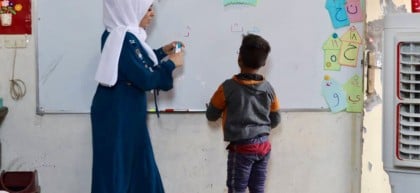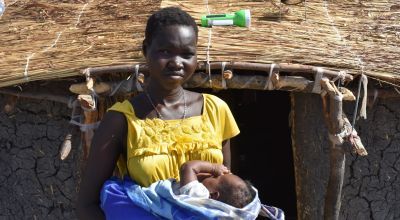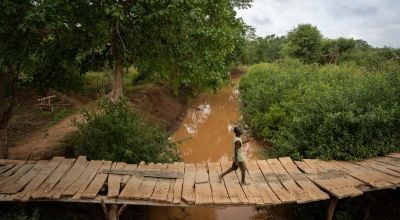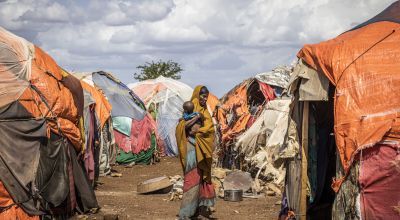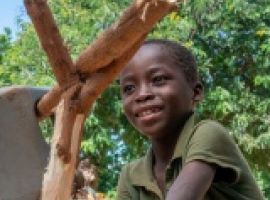
Read our 2022 annual report

Knowledge Hub
Nearly three decades of ongoing conflict in the Democratic Republic of Congo have led to one of the most complex and longstanding humanitarian crises in Africa.
Continued violence has driven millions of Congolese out of their homes and into host communities and camps, resulting in 5.7 million internally displaced persons (IDPs) - the largest number of IDPs on the African continent. And the situation is only growing worse, due to a resurgence of violence in eastern DRC. Since March 2022, over 800,000 people in the east of the country have fled their homes, with women and children at particular risk of discrimination and gender-based violence.
Conflict and displacement have exacerbated an already dire food crisis - the worst food crisis in the world. A quarter of the population - that’s 26.4 million people - are facing acute food insecurity in 2023. In addition to in-country violence, the conflict in Ukraine and the ongoing impact in the aftermath of the COVID-19 pandemic have led to significant price rises for food, increasing pressure on the 60 million people already living on less than $2.15 a day.
With conflict and food insecurity combining to create a deadly crisis, reaching those most affected by conflict in eastern DRC is of vital importance. Concern has been working in DRC since 1994, and supports numerous programmes and initiatives to assist those who have been forced to flee their homes due to conflict, and who are struggling to feed their families.
Emergency cash assistance
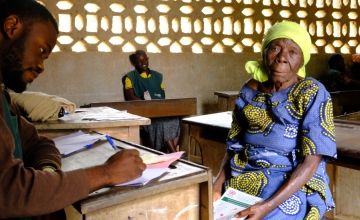
In Oicha, in the North Kivu province of eastern DRC, thousands of Congolese have sought safety and shelter from violence in their home villages. Among them is Christine. She told our team that she does not know her age, only that she was born before the Democratic Republic of Congo got its independence in 1960.
Up until February 2022, Christine lived in Béu Karégo, a village of North Kivu, with her husband, their eight children and two grandchildren. But then, horror struck. During an armed attack on their village, Christine’s husband and two of their children were killed, with their house being set on fire.
Christine and her remaining family had no option but to flee to a more secure area. They found a small house to rent in a neighbourhood in Oicha, but there was not enough space for the whole family, despite spending all of their money on rent. Christine moved into a small room with relatives, but is unable to pay rent or contribute to household costs - something she feels guilty about. Returning home to Béu Karégo is not an option. Christine fears that cacao producers she knew who tried to return have been abducted or killed by armed groups.
Our team was able to reach Christine with emergency distributions, including a cash transfer. She told us that her priority was to rent a small house to live with her family. With the rest of the assistance provided, she hopes to buy fuel to sell, so she can continue to provide for her family.
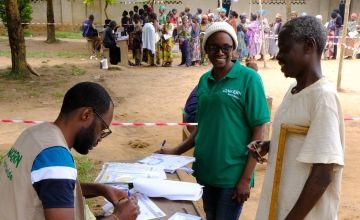
Papa Ditase, a cacao producer from the same village as Christine, also benefited from this programme. In April 2022, an armed attack on Béu Karégo saw Ditase’s wife and two of his sons, aged nine and 11, abducted. He still does not know if they survived.
Amid burning houses, Ditase fled the village with his remaining eight children, and found safety in Oicha. Here, they have been split up amongst host families, and finding money is a huge concern as Ditase cannot return to tend to his cacao farm due to continued conflict in the area.
The assistance Ditase received from our team allowed him to buy much needed food for himself and his children. He also plans to use the remainder of the cash assistance to establish a small income-generating activity with his eldest children, buying cassava maize in the surrounding villages in order to sell.
We have reached over 10,000 households like Christine's and Ditase's, who are fleeing conflict in the region.
Building resilience
Another effect of conflict is that families struggle to cope with shocks, like extreme weather, and are unable to seek training or assistance. Kalunga Fatuma Jeanne, a widow with seven children living in the Kalemie territory, was left in a difficult situation when a serious storm destroyed the roof of her house. She was already struggling to provide for her family following the loss of her husband, and was unable to restart their fish-selling business due to a lack of business and entrepreneurship skills.
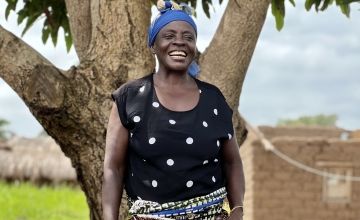
This is where MAC - Multi Sector Assistance for Conflict Affected Communities of Eastern DRC - came in. We're working closely with vulnerable families and communities in order to help them withstand such shocks. One of the most important aspects of that is to ensure that social protection measures are put in place, as well as tackling gender inequalities and ensuring that women are empowered, financially and otherwise, to take leadership roles within their households and their communities.
Kalunga was selected to participate in the 'income generating activity' section of the programme, in which she received training in gender equality and social protection, and joined a local Village Savings and Loan Association. She also received a cash transfer to help get her started.
Now, she uses her newly acquired skills to counsel her family and plans to restart her fish business. Above all, she hopes to use her savings to repair her home following the storm.
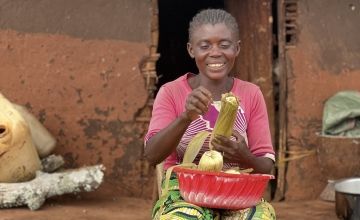
Feza Fatuma Amisi also received assistance from the MAC project. She lives in the village of Kambili in Kalemie territory - where 50% of the population face food insecurity - with her husband and five children. Despite both working in farming to support their household and pay school fees for their children, Feza and her husband were unable to afford three meals a day, resulting in a high level of hunger in the household.
In November 2022, Feza received a distribution of maize, groundnut and cowpea seeds from us, to improve her household’s diet. To tide the family over before harvest, Feza also received three rounds of oil, maize flour, beans and salt.
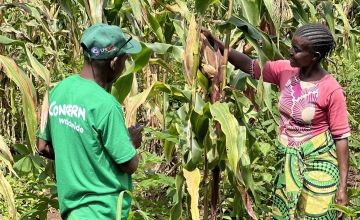
Three months later, Feza was able to begin to harvest maize, which she has used to feed her family. She also plans to use a portion of her crops to sell, using the money generated for household necessities.
Feza said: “I have seen that after the intervention, there have been fewer cases of death from malnutrition and hunger in my village.”
Organisations who fund us
